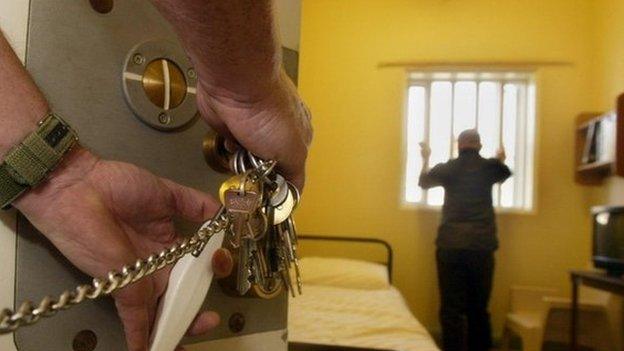Too many inmates 'jailed needlessly', says review chief
- Published
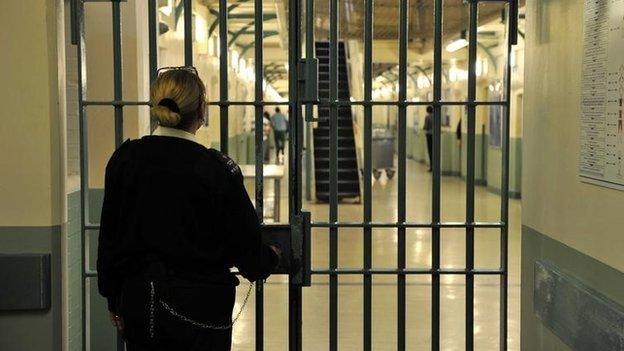
Too many people are being jailed unnecessarily, the head of a review into prison suicides has said.
Lord Harris claimed resources were being weakened, leaving vulnerable inmates unsupervised.
It comes as the parents of a man who killed himself at a young offenders institution criticised authorities.
The National Offender Management Service said reducing the number of prison suicides was a top priority.
'Critical issue'
Labour peer Lord Harris was asked by the government in February to conduct a review on how to reduce self-inflicted deaths in custody, and is expected to present his findings next summer.
He believes the unnecessary imprisonment of some individuals, including those with mental health problems, is preventing others from receiving the support they need.
Lord Harris said: "The critical issue is why some prisoners are [in jail] in the first place.
"Are there interventions that could have been done, could have saved the government money by stopping them ending up in the criminal justice system in the first place, or not necessarily ending up in prison?
"Obviously there will always be a core of prisoners who do need to be in prison. But, if some of the others were not there, there would be more resources to make sure those individuals were supported and prison achieved its objectives in terms of rehabilitation."
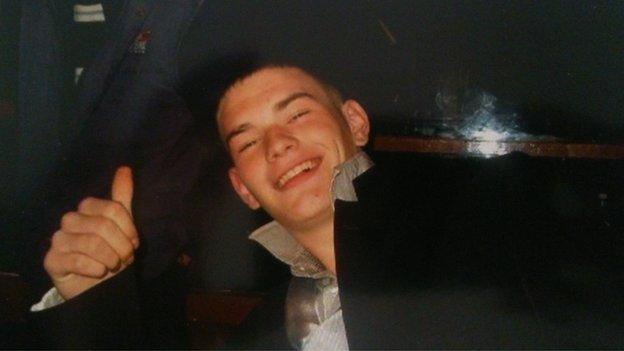
Steven Davison, from Loughborough, initially went to Glen Parva on remand in June 2013
Lord Harris's comments come as the parents of Steven Davison, a 21-year-old man who killed himself while at Glen Parva young offenders institution in 2013, questioned why prison authorities did not do more to protect him.
'Low risk'
Davison, from Loughborough in Leicestershire, was jailed for possession of a knife, with which he had threatened to harm himself.
He was told he would be moved to a mental health hospital when a bed became available, but killed himself in his cell in September 2013.
An inquest ruled staff had failed to monitor him properly and were inadequately trained in helping those who were vulnerable.
His mother Lynda explained: "It was like 'he's just another lad who's been sent to prison'."
Lynda Davison, Steven's mother: Prison "didn't look after my son before suicide"
She added: "Instead of looking at why he's been sent to prison and what he needed, it was like [the authorities said] 'There you go Steven - there's your cell - get on with it'."
Davison was graded as at "low risk" of self-harm and suicide at the prison, and was not moved to a safe cell - where he would not have been able to hang himself - the inquest heard.
His mother said he was "let down" by prison authorities, even though he "cried for help".
Davison's father, Jeffrey, said the people who assessed his son were prison officers and "weren't trained in mental health".
He also criticised the lack of communication coming from Glen Parva.
"We didn't even know he was self-harming himself in prison," he said.
'We can't be everywhere'
A prison officer at Glen Parva, who wished to remain anonymous, said self-harm incidents in the prison were a daily occurrence "from minor scratches to people taking chunks off their arms".
"It is very, very difficult to monitor the lads because of staff shortages - we just don't have the manpower to look after those who are vulnerable or need special attention," he explained.
"If someone is on constant watch, we have to sometimes call in staff from other wings, which means that wing then suffers. It's not our fault, because we can't be everywhere all the time," he added.
Last month, chief inspector of prisons Nick Hardwick said there had been a "rapid deterioration" in prison safety in England and Wales.
At a recent Justice Select Committee hearing, it was also acknowledged by officials they had underestimated the increase in prison population which hit the system last autumn. Prior to that, hundreds of staff had been made redundant and 16 prisons had been closed down.
'Same mistakes'
Prison suicides in England and Wales have risen by 52% since 2011-12, according to Ministry of Justice statistics, external.
They reveal that 87 inmates took their own lives over the 12 months to September 2014, compared with 57 in the year to September 2012.
In some cases, suicide had been the result of bullying and violence.
Ministry of Justice figures, external show the number of recorded assaults in English and Welsh prisons has increased by more than a thousand over the last year, from 14,045 in 2012-13 to 15,441 in 2013-14.
Deborah Coles, co-director of Inquest, a charity that helps families of people who die in custody, said more help was needed for vulnerable prisoners, especially those with mental health issues.
She told Today: "We are sending far too many people to prisons that are ill equipped and ill resourced to deal with their needs."
She said many suicides in prison are "preventable" and added: "All those people charged with the inspection and monitoring of prisons are warning ministers that there is a crisis and I think that ministers' indifference to this issue is really concerning.
"If we don't dramatically reduce those going to prison we're going to see ongoing deaths of men, women and children."
Steve Gillan, general secretary of the Prison Officers Association, said officers did not receive sufficient mental health training.
"It's become critical now and you can't be in denial that there's inadequate training for the modern prison officer," he told BBC Radio 5 live.
'No simple explanation'
Michael Spurr, chief executive of the National Offender Management Service, said that reducing the number of self-inflicted deaths in prisons was a top priority.
He said: "The rise in the latter part of 2013 and in the early months of this year was very concerning and we have been working hard to understand the reasons for this.
"As is the case in society at large, there is no simple explanation with complex and individual reasons behind any suicide."
And he added: "Every death is tragedy for the individual and their families and we will continue to work tirelessly to prevent suicides in our prisons."
Nigel Newcomen, the prison and probation ombudsman, said many jails were making the same mistakes: "Some of the particular concerns we have are about weaknesses in risk assessment, weaknesses in... the suicide and self-harm prevention processes.
"These are weaknesses we've been identifying for a number of years," he explained.
Meanwhile, Jeffrey Davison remains angry at his son Steven's death, and with the way the Ministry of Justice runs its prisons. "As far as I'm concerned the prison didn't look after him," he said.
"We didn't want them to love him. We wanted them to take care of him... and then he can come home to us."
Listen to BBC Radio 4's Today programme each weekday from 6:00 GMT - 9:00 GMT, and on Saturdays from 7:00 GMT-9.00 GMT.
- Published14 November 2014
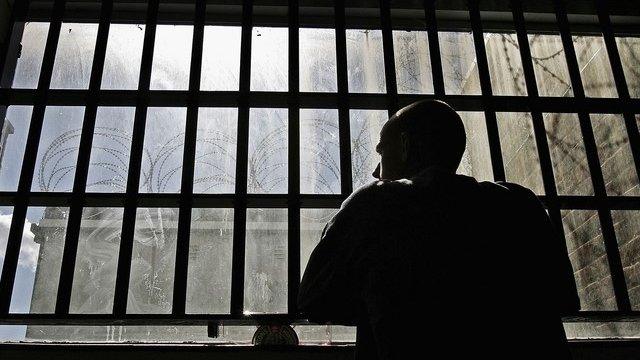
- Published14 November 2014
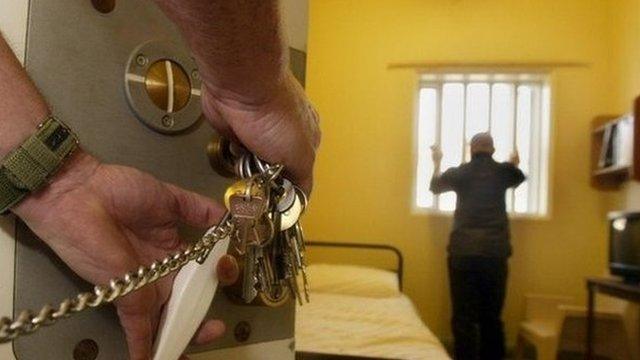
- Published10 September 2014
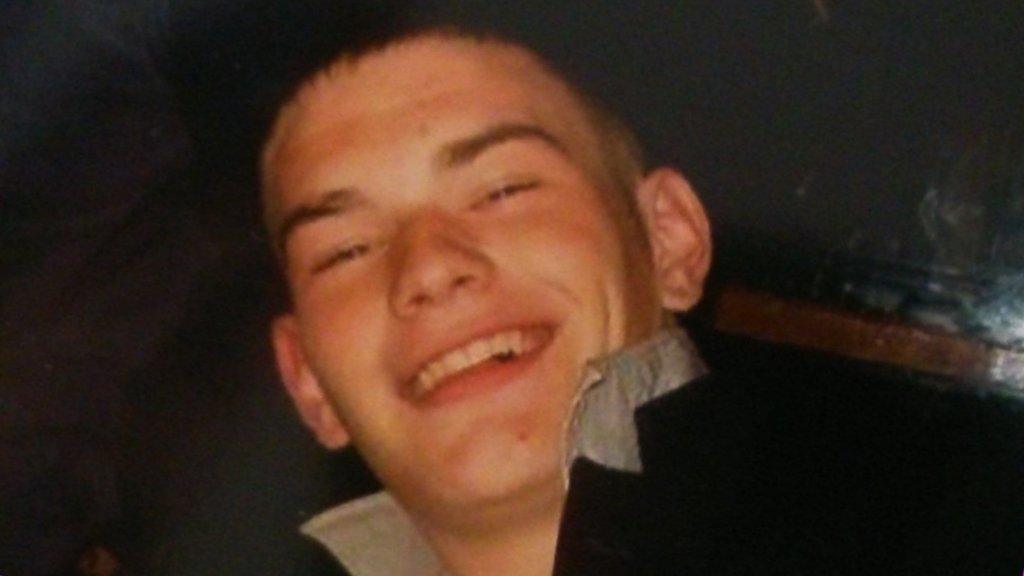
- Published11 September 2014
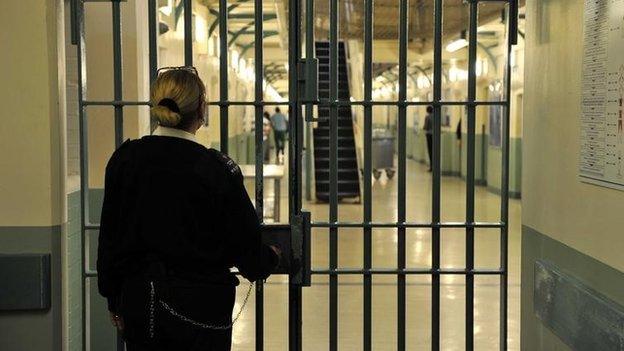
- Published13 June 2014
